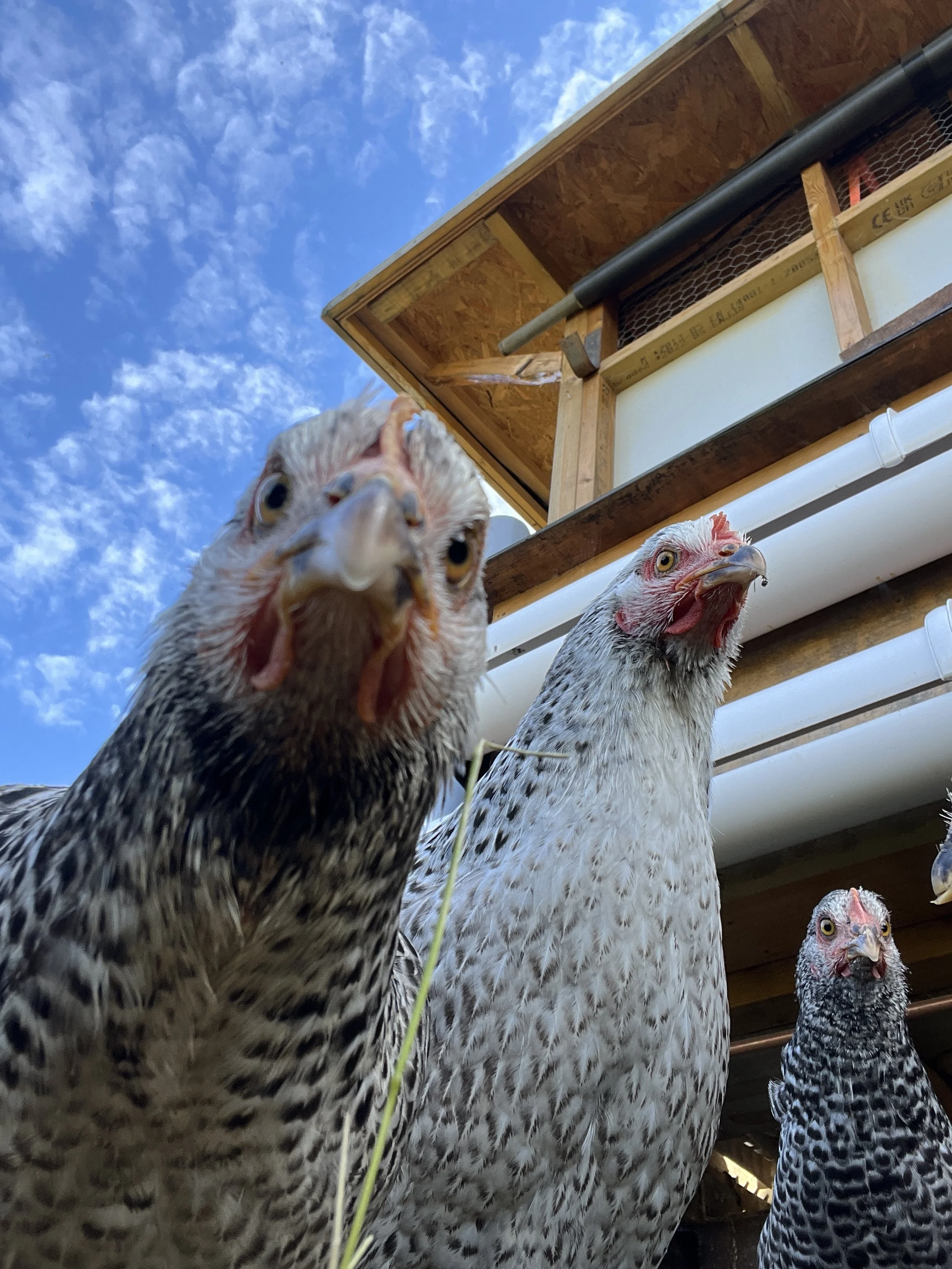Animal Welfare
Current Issues
Most commercial egg farms use brown-feathered birds that have been bred by genetics companies for high productivity above all else. These birds have essentially become egg-laying machines, which is so demanding on their bodies that they have a reduced lifespan. Most farms will get rid of these hens after just one laying cycle (hens need to take a break from laying to grow new feathers) because their productivity drops, so they’re no longer profitable enough to keep. These hens will either be slaughtered and turned into pet food (their meat isn’t very high quality because all their energy goes into producing so many eggs) or sometimes charities will collect them to rehome as pets.
Even free-range commercial systems can have welfare issues, one of the reasons being the flock sizes are so huge: thousands and even tens of thousands of birds per flock! This makes it hard to give attention and care to individual hens and reduces the birds to statistics, rather than individuals with their own personalities. In a commercial setting, hens are worth very little as individuals, mainly because the price of eggs has been pushed down by supermarkets at ‘price wars’ with each other.
With such large numbers of birds, when something spooks the birds, or conversely if there is something good in their environment that they want to get to, this can cause pile ups where hens suffocate and die – these ‘smotherings’ are sadly common on commercial farms.
Feather pecking is another common problem in commercial flocks – where hens peck each other’s feathers out which causes pain and discomfort and a decreased ability to keep warm. This behaviour is mainly redirected foraging behaviour, so a major contributor to this problem is lack of stimulation in the birds’ environment. Even in free-range systems, thousands, or tens of thousands of birds in one place easily leads to degradation of the outdoor and indoor area and depletion of resources, and so feather pecking occurs.
Of course, only female chickens lay eggs, so the males in these brown-feathered breeds can’t be used in the egg industry. Because the breed is so highly selected for egg-laying ability, their ability to grow muscle (meat) is reduced. Therefore, the males are not profitable enough to rear to produce meat. Instead, they’re killed as soon as they hatch. Essentially, we’ve reduced these sentient, living creatures into worthless by-products, which must be discarded (gassed or shredded live) as soon as they struggle out of the shell.
Leaf & Feather’s solutions
All the hens at Leaf and Feather haven’t been bred to be egg-machines, but instead are selected for characteristics that improve their welfare, such as living a long healthy life with a robustness to thrive in the great British outdoors.
The hens at Leaf and Feather are also what are known as ‘dual-purpose’ breeds. This means that they’re good at producing both eggs and meat. Therefore, males of these breeds aren’t killed at birth but are reared for free-range meat production.
Every bird at Leaf and Feather is like a pet to me – they are all valued as individuals and living beings, not stats in a spreadsheet. If any of them seem poorly I treat them with TLC and herbal remedies and will seek a vet if needed. All the birds will be kept far beyond just one laying cycle.
What’s more, as a researcher whose work focusses on how to provide farm animals with the best possible life, I provide positive experiences for my hens above and beyond current welfare guidelines – even Soil Association standards, which are already very high. This means providing things to spark their interest such as different materials to scratch around in and a variety of foods to enjoy such as different herbs, vegetables, and even juicy larvae which the hens go absolutely mad for! (see ‘Environment’ for more information on the larvae). It also means increasing their comfort, for example, loads of perches, and dustbathing opportunities for them to have a chicken version of a bubble bath, whatever the weather! All these things are pleasurable experiences for the hens, ensuring that they are kept happy ladies.
I also practice rotational grazing, where the hens are moved to different parts of their plant-rich pasture twice a week in their amazing purpose-built chicken tractor. This means that not only do they have space to roam but also that they get fresh exciting new vegetation to explore and eat throughout the year, instead of depleting the same bit of land. This is also good for nature – it allows plants and insect populations to recover, and to benefit from the added chicken manure!
The small flock size of just 150 hens means that the risk of smotherings is non-existent, plus the hens can recognise each other and maintain a natural hierarchy as they’ve evolved to do. They have also evolved to live in female groups alongside a male chicken (a cockerel). Therefore, in order to create an even more natural social structure, I keep three cockerels with the hens.

Leaf & Feather’s solutions: Happy Hens
(and cockerels!)



